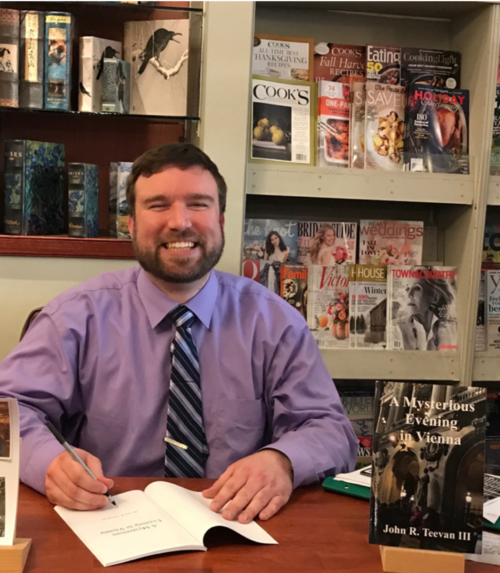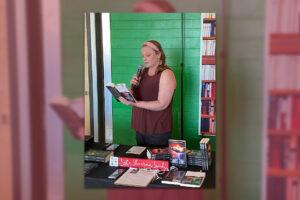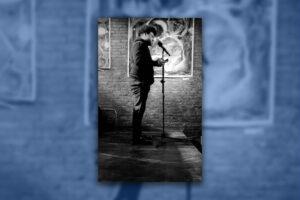By Octavia Findley
Octavia Findley: Can you describe your craft for me?
John Teevan III: “Well, I love to write. I’ve always been a writer, since I’ve been old enough to hold a pen. I do creative writing, fiction, and dabble in spy fiction, travel writing, romance, historical fiction. Mostly I write short stories, and I’ve published a couple collections of short stories. I’ve self-published A Serious Evening in Vienna, The Love Letter with a Bullet Hole,and The Traveler’s Sketchbook. The last one dips into another creative outlet that I have which is drawing.
OF: [Regarding a hand drawn portrait of a pyramid] Is that the one at New Paltz?
JT: No, that’s at the Louvre.
OF: More places that I want to go to…
JT: Yeah, Paris is beautiful. It’s from when I studied abroad at Sorbonne University, and I did a lot of drawing. Well, the cover of my book, is the Louvre, with the glass pyramid and the beautiful historic palace. The back cover is the dormitory where I stayed, which was a palace in and of itself. I was walking by it every day to get to the subway to go to class, and I wanted to remember it. So rather than take a picture, y’know, press a button for two seconds on your phone and then forget about it, I remember every detail by drawing the things that I see. And that’s how I bring back the memories that I really want to remember.
OF: [Flipping through the The Traveler’s Sketchbook] I’m looking at it, it’s gorgeous, I haven’t gotten quite past stick figures yet.
JT: [Laughs]
OF: I wish I could draw like this, I’ve not the time or patience for more than one way to use a pencil. …you went to D.C.?
JT: Yeah, so that one is from D.C. I went to the capital. I travel a lot, to different countries and cities outside of the U.S. I love to write. I love to write. But, writing is my second favorite hobby. My favorite hobby is traveling. I love to travel at every opportunity I get.
OF: As a hobby? Is that Notre Dame?
JT: Yeah, that’s Notre Dame Basilica.
OF: Wow, I’m sorry, I’ve having too much fun with your sketchbook-
JT: [Laughs]
OF –I’m supposed to be asking you questions.
JT: But, writing and visual arts, creative arts all go hand in hand. The visual expression and the written expression. They’re all one in the same.
OF: OKAY. [Puts down book] We’ll be here all day, with me admiring it. What’s your favorite part of the writing process?
JT: “Writing’s a very introverted task. You’re in a room by yourself, writing. So there’s that aspect. My favorite part is when you bring it to life. When you bring that concept and share it at a book launch. It’s so exciting to gets readers that come up to you and go, ‘Oh I’m such a fan of your book! I loved how you wrote this. Did you mean this? How did you interpret this? Where’d you come up with this idea?’ So, it’s really fun to bring it to life. Your book is like your baby. And you’re bringing it to life, in the world, and it outlives you. And it’s such an amazing experience.
OF: So after the book is done, and you’re sharing it?
JT: Yeah, sharing it in the sense of bringing it to life. You have the solitary idea that you came up with, writing all alone, and then you bring it into society. And everybody enjoys it. And you have readers on five continents that want to read your books and are asking you questions. Interacting with the fans. Your baby has come to life.
OF: Aww. I’m too busy to have my own paper children.
JT: [Laughs] Paper children, that’s exactly what it’s like.
OF: Who’s your greatest influence as an author?
JT: “I really like Victor Hugo. My background’s in History and French Studies, and Hugo’s a historian, obviously he was French. I love The Hunchback of Notre Dame, it’s one of my favorite books of all time. I love Les Mis, Les Misérables…Yes, yes. It’s a good musical, it’s so dramatic, it captures the essence of the human spirit. I find a lot of inspiration in Hugo’s historical style. A lot of my stories have historical references, I chose to use footnotes instead of MLA, Chicago’s what historians use. So, Hugo is a huge inspiration. I admire him I also really like J.K. Rowling. The inspirational story of the writer who is living in poverty and comes up with this brilliant idea and changes the world. Now Harry Potter’s everywhere.
OF: And it will definitelyoutlive her. It’s a pop culture phenomenon in and of itself. I’m Hufflepuff and I’ve never cracked open a Harry Potter book in my life!
JT: [Laughs] I’m a Ravenclaw. Everyone identifies with the writing, and it really became this baby that came into the world and everyone can enjoy.
OF: Well the baby is now old enough to have babies.
JT: [Laughs]
OF:AND IT DOES. It’s called Fantastic Beasts and Where to Find Them.So, off you go! What’s your favorite genre for leisure reading?
JT: Y’know I don’t actually read a lot. A lot of writers, when I was first interested in self-publishing, I contacted a few published authors that I knew, and I asked them, ‘Is it possible to be a successful writer without being a heavy reader? Can you write well without reading a lot?” And every single one of them said no. You have to know what good writing looks like, you have to read everything out there. You have to interact with the literary community. You have to read people’s stuff so you can write back and they’ll read your stuff. But I’m not a big reader, I’m more into the expression, the writing, rather than the opposite of that. The intake, the reading. I’ve never taken a writing class, I’ve never taken an English class, I’ve never taken a drawing class. I’m self-taught for the writing and the drawing. It’s just an expressive, creative outlet. I like writing, but I’m not a big reader.
OF: Would you like your work to be made into a film?
JT: “That would be amazing. I can see what they would look like.
OF: I mean, the sketchbook would be interesting. You would have to find some guy that looks as well as you do, that could get your mannerisms and all…
JT: [Laughs] Well, the sketchbook would be a documentary, a biography of the artist. But the short stories, those, they’re very easy to make into movies. You’ve got very definite characters. They have, you can just see the look in Sam and Louise’s eyes. You can just feel the passion of the [unintelligible] as they’re fighting persecution. So many of these stories, they have such vivid imagery, they’ll go very well into a movie. Someday, who knows? But, y’know, the spy’s white dress in this Latin American country, on the verge of revolution. It actually came to me while I was in San Juan, Puerto Rico. The first thing I thought was, ‘Wow. I’m going to write this story, and hope some movie be made of it.” San Juan is so historical. Beautiful. It’s got a vibrant culture. I did some drawing, took some pictures. But most of all I wrote. I wrote and I wrote and I wrote. I came back to my writing group, and I was inspired to write this story. I’m currently working on a book-length sequel to that short story.
OF: Good Luck!
JT: It’s already written too! That one, I can see it so vivid. The imagery is so beautiful. But we’ll see! Maybe someday they will!
OF: Do you have any advice for beginning authors?
JT Well, for me, the writing is the easy part. The sharing is the hard part. A lot of writers are introverts, a lot of them are very shy. So, it’s always easy to be writing and creating these ideas, but to actually self-publish and to put them out for the world to see, these books will be tied to my name on the internet for all eternity. I can’t take them back. A lot of writers sabotage themselves. They’re so shy and timid that they don’t go ahead and share their writing, they just create it and then they leave it there. I always think that writing a book takes more courage than creativity. A lot of people have the creativity, a lot of people write, but to actually go out there, go on the internet, share it, publish it. You can’t take it back. … My advice would be once you think you have a really good piece, share it! Go to an open mic. I did my first open mic, it was in Montreal, it was all in French, which was really exciting. But you can go to an open mic, it was not high stakes, it’s not going to be published. You just say it and people clap and praise you. You can also self-publish, which is a lot easier than traditional publishing. Or submit to a literary journal. But there are many outlets where people can put their name on the record. A lot of people are too shy to go forward and share it. But once I took the step, I stopped writing and started sharing, it made a huge impact on my life. Now I have fans on five continents. It’s so rewarding to meet the readers and have your family say, “I didn’t know you did that!” If I didn’t share and publish it, then nobody would know I was a writer. Now that I’m published, people from work, from family, from friends, they’re all coming up to me and going, “I didn’t know you had this talent!” So my advice to prospective writers would be to share it. Take the leap. Because you ever know what will happen.
As I published my first book, I was on the fence, I had my mouse, my finger on the mouse, on September 3rd, for a very long time. If I clicked publish, bam, it goes on Amazon worldwide, everyone can see it. So I’m sitting there with my mouse, I’ve already edited to date. The draft was fine, but I wanted to read it the day of, to make sure nothing had changed. I’m just sitting there, thinking, ‘Is this what I really want to do?’ I hit publish. Six days later, I google the title to see social media coverage. I find out, it’s number two on Amazon’s best-selling new releases in its genre. It was Amazon’s hot new releases. If I didn’t click submit, if I didn’t click publish, it wouldn’t have become a bestseller. But because I clicked submit, I stopped writing and started sharing, I’m a bestselling author…
One other piece of advice that I do want to share is that I make my own covers. It’s very expensive to hire a graphic designer to create a cover. People do judge a book by its cover. You own the copyright to any photo if you take it yourself, but you just can’t google images and make that your cover because of copyright infringement. Don’t delete any photos. … There was this one time, I needed space on a computer, so I went and deleted photos. Eight years later, I’m publishing this book and I’m looking for pictures of San Juan, Puerto Rico and I’ve deleted sixty percent of them. One of them could have been a beautiful cover picture. … I wish I hadn’t deleted the photos; I’m not going to fly back to Paris to take the photo.





